With the release of his recent novel, The Black Flame of Paradise, and an invested art practice, Zachary Cahill has located an aesthetic voice that combines thoughtful analysis with an in-studio physicality that clearly reflects the relationary content that defines our current milieu. Though, upon initial encounter with Cahill’s art and ideas, one may cull only a seemingly abstract and chaotic reality, though through further inspection one will locate reasoned movement that is creating a visual vocabulary that looks at the intersection occurring in the transition in approaches to religion and spirituality, the power in political metaphors, and a day-to-day existence in search of a connection with the divine. This week, the COMP Magazine ran over to East Garfield Park to discuss with Cahill how his early experiences as a wrestler impacted his present day practice, his love of comics (specifically Jack Kirby), his new novel, the role of contemplation and writing in his practice, and what’s on the docket for the new year.
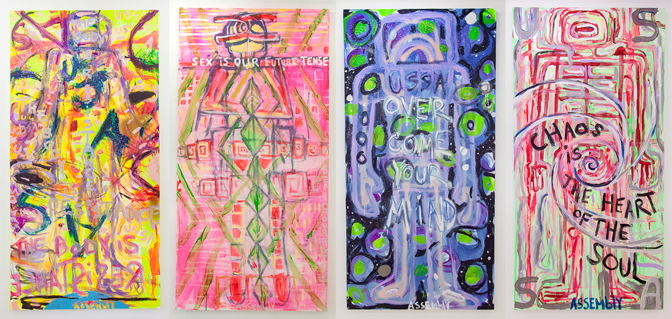
Zachary Cahill, USSA SAINTS, 4 paintings at 38″x 78″, acrylic on canvas, 2017
You’re from out east, studied at Cornell University, then at the University of Chicago. In conversation we discussed Jack Kirby, the Dark Horse comic Baltimore, the afterlife, making art, wrestling, and a flurry of other items. I want to back up a bit to set a foundation, I’m wandering if you can identify any early experiences or people who prompted you to focus your life on your current investigations?
First, I want to thank you for the visit, it was such a pleasure to have you by the studio Chester. I mean you have no idea how excited I was to find another Baltimore-o-file! I basically consider it some of the best art I came across in 2017. If I were to have been asked for one of those top ten end of the year lists by some an art publication, Baltimore would have been high on that list. Comics are super important aspect of my development as an artist…I know, I know, I am hardly alone in this…They combine two things I care about drawing and writing…and what’s more, comics usually form a world I can escape to…maybe now (in my own work) It’s not so much a world that I want to escape to, but maybe it’s a world we give birth to…Phusis…I like that word in relation to art maybe more than poesis or praxis…
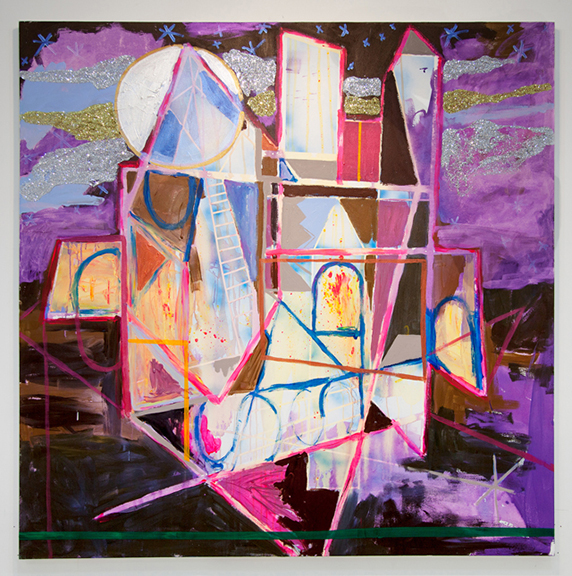
Zachary Cahill, USSA Cathedral of Lost Souls (mercy), 72″x72″, acrylic on canvas, 2017
You have established an umbrella, USSA, for a number of your ongoing projects to be aligned within. The term, USSA, is fairly loaded. I’m fascinated with how this can be interpreted as ambiguous, mysterious, political, etc.? How do you partition these works from other investigations? Is the process organic or do you have a long term intent for this series?
The process for me is organic and none of my work in the last decade has fallen outside of this project…What I am doing is the project, and the project, is what I am doing (if that makes sense). At this point I am just not interested in anything else enough to drag me away from it…Someday I suppose that may happen and I’ll move on but at this time working on the USSA is basically the thing that really makes me feel grounded and motivates me as an artist.
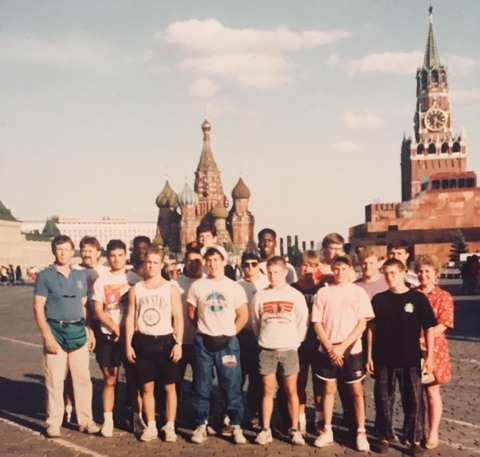
Zachary Cahill, Image of the artist as wrestler, Red Square, Moscow, Russia, July 1991
One item that stands out to me is the physicality of your work. I’m drawn to the scale, messiness, and multifaceted content. In your youth, you wrestled competitively, even traveled to Russia in the early 1990s. Can you describe your relationship to this and how you think about the tactile application in production?
For better or worse my former incarnation as a wrestler has had an impact on everything that I do—often in ways I am not conscious of…But I think you are correct in seeing the importance of physicality, the bodily and material in my work. Entering the sport of wrestling was really about a mode of survival in my household…I was the youngest in our household and my brothers all wrestled…In many ways, I didn’t have a choice–still its hard to imagine my life without that early formative experience.
…and wrestling was as you note a way for me to come into contact with people from other parts of the world…I loved that about the sport…In the summer of ’91 I traveled to the Soviet Union with a US Team and for an eighteen year old kid it was a mind opening experience. I feel really have lucky to have gone…a few weeks later the Soviet Union would collapse…I guess some of my interest in ideology is rooted in that trip…Growing up in the 80s under Reagan we had heard that it was the “evil empire”…My experience there showed me something quite different from the American Cold War Propaganda.
Anyways, yes I guess it is true I like to wrestle with material…somehow it makes sense to me…to engage material in that way…to struggle with it…you know, I suppose I like to think from time to time but when I am making art in the studio, I am just with it and I am operating on instinct and intuition…that for me feels real….i think there are all sorts of intelligences…and I gravitate to a bodily and raw intelligence when I am making work….how things find their balance and barely hang together…That kind of physical precarity seems to me like it can say something about our own world, our own fragile bodies…I never really had my shit together… my shit was always scattered…I used to see that as a weakness and now I just see it as how I operate i.e. it doesn’t look like that is ever going to change…
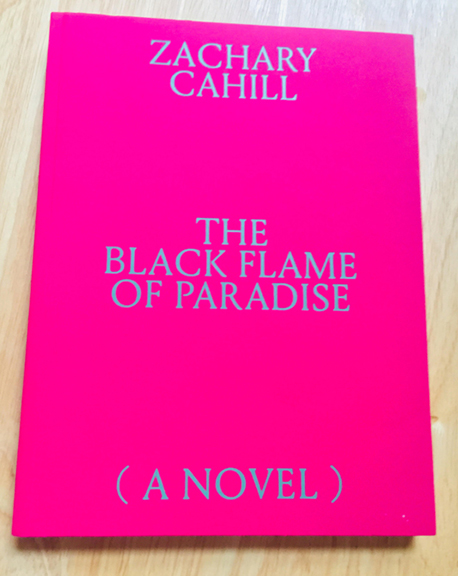
Zachary Cahill, The Black Flame of Paradise, Mousse Publishing, 2018
You noted the importance of spending time in contemplation and writing in your practice. You just published a novel, The Black Flame of Paradise, with the Milan-based Press, Mousse Publishing . Can you offer a summary of the content of the book, also, why do you think writing is important in developing your content?
So, following on all that stuff I just said about the body and matter…Writing is another kind of thing for me…but it is very much at the heart of my work…Really, the material stuff and the writing are one thing…I have trouble explaining this to people sometimes but they are the two sides of the same coin…If you just see the paintings and sculptures you are kind of missing out on much of the work. Likewise with the writing. I like that people can appreciate each on its own…but the two together is really what my work is…
Maybe its a bit like like this…You see a public monument and it’s a nice thing to walk around, touch or what have you but there is a story there too, a history, the reason for it being there in the first place…like what is the Vietnam Memorial without the names and context but a minimalist sculpture What is it if you can’t read and don’t know history…It is a big, impressive piece of stone sculpture and it works on you at bodily level, but when you can read those names and you understand the context…well, then it may hit you in a whole other way…That is a loaded example, but that’s kind of what I mean by the connection between writing and the object…(it is more complicated then that really)…
Therefore, to indicate that this dynamic is operative in my work at the end of the novel there is a collection of plates from exhibitions and artworks that I have made…they are not illustrations for the book (although maybe they are– and that’s not so horrible) they are more like my effort to show how my work is rooted in the real world…the stuff you are reading is an object too…it is a romantic project to make a book consubstantial with the world…to novelize the world …I borrow these phrases from Art Historian Joseph Leo Koerner’s book on Caspar David Friedrich where he is talking about the novel and Romanticism in Germany.
I am not sure I can summarize the novel for you yet…Philosopher Catherine Malabou (who wrote the preface) referred to it as a “non-religious experience of religion”…I think that is good synopsis–that is at least what I was after.
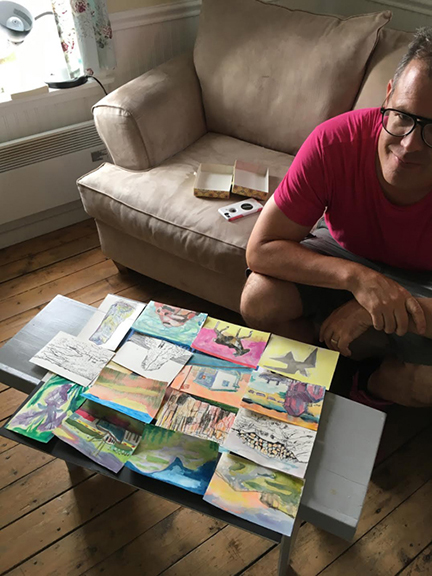
Zachary Cahill, Artist with Post Cards, Fogo Island,
Newfoundland and Labrador, Canada, 2018
What do you value most in your aesthetic practice?
I guess it matters that people feel something and now that a human made the work..at the end of the day that’s what matters that people can feel another human presence…I am not an algorithm…I don’t have a factory making my work…it is just me in all my human smallness trying to connect with you in anyway (or everyway) that I can…so that maybe we (the viewer and I) are not alone..
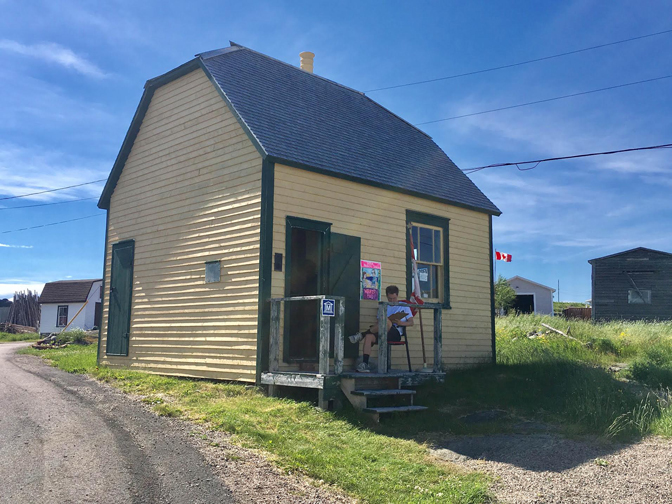
Zachary Cahill, USSA Casting Call, Titling Post Office Museum, Fogo Island Arts, Newfoundland and Labrador, Canada, 2018
As noted, you are currently preparing work for exhibition and have a book being released. What else is on the agenda? Do you have any other items you hope to realize or put into process by year’s end?
I am getting ready to start a new institution for the USSA…The Postal Service which I began to work on this past summer when I was an artist-in-residence with Fogo Island Arts. I’ll get to show the first itieration of the postal service as part of a group exhibition curated by Dieter Roelstraete entitled Little Worlds at the Neubauer Collegium Gallery in January…So that is super-exciting for me…and I am thankful to Dieter for giving the USSA Postal Service a change to step out into the world..He has been really supportive in that he really understands the work…Some times when I tell other people I am doing something about the postal service they almost seem embarrassed for me because it is such an unsexy topic but that is pretty much how I know that I am on the something…so stay tuned 🙂
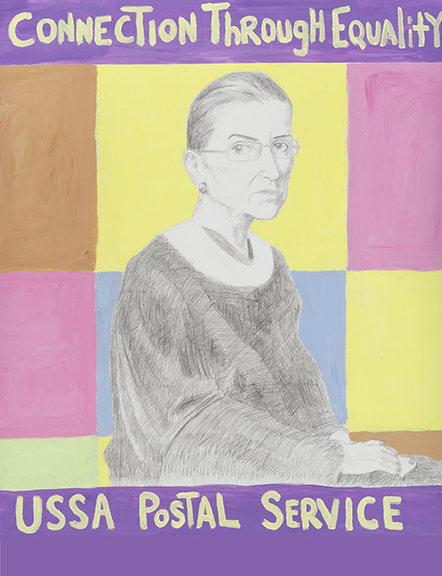
Zachary Cahill, Equality<
For additional information on the aesthetic practice and writing of Zachary Cahill, please visit:
Mousse Publishing – https://www.moussepublishing.com/?product=black-flame-paradise
Zachary Cahill – https://zacharycahill.com/home.html
ArtReview – https://artreview.com/futuregreats/jan_feb_2017_future_great_zachary_cahill/
Graham Foundation – http://www.grahamfoundation.org/grantees/5748-the-black-flame-of-paradise
Inside/Within – http://insidewithin.com/zachary-cahill/
MCA Chicago – https://mcachicago.org/Exhibitions/2014/Zachary-Cahill
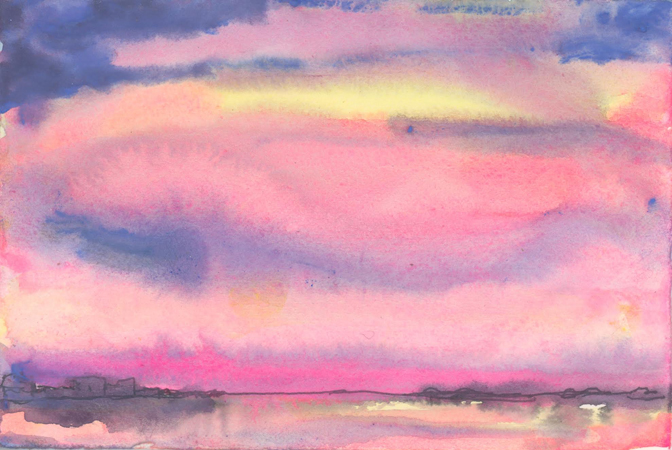
Zachary Cahill, The Harbor at Joe Batt’s Arm, watercolor on paper, 2018
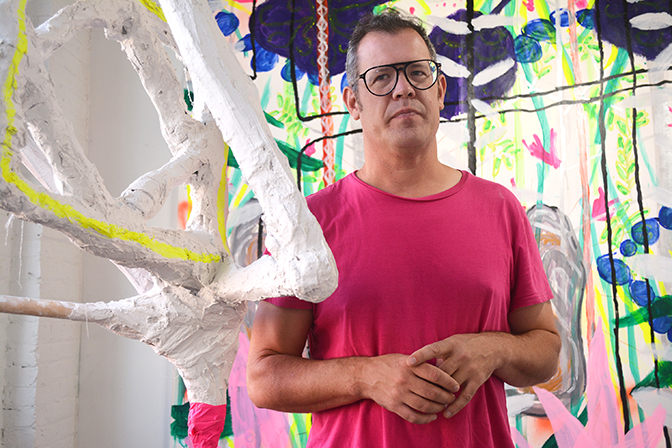
Zachary Cahill, artist and writer, Chicago, 2018
Artist interview and portrait by Chester Alamo-Costello


